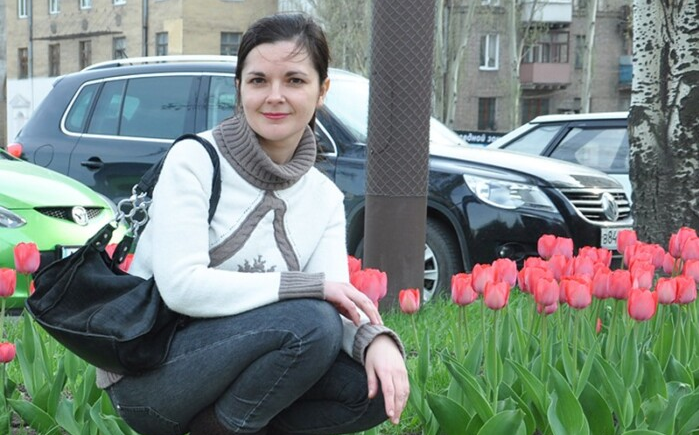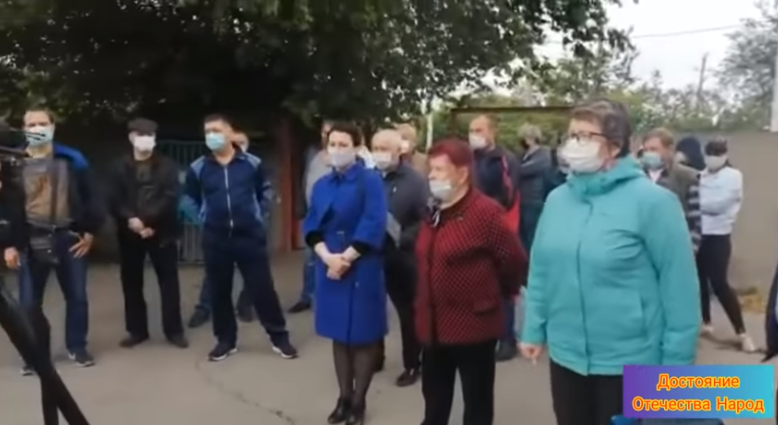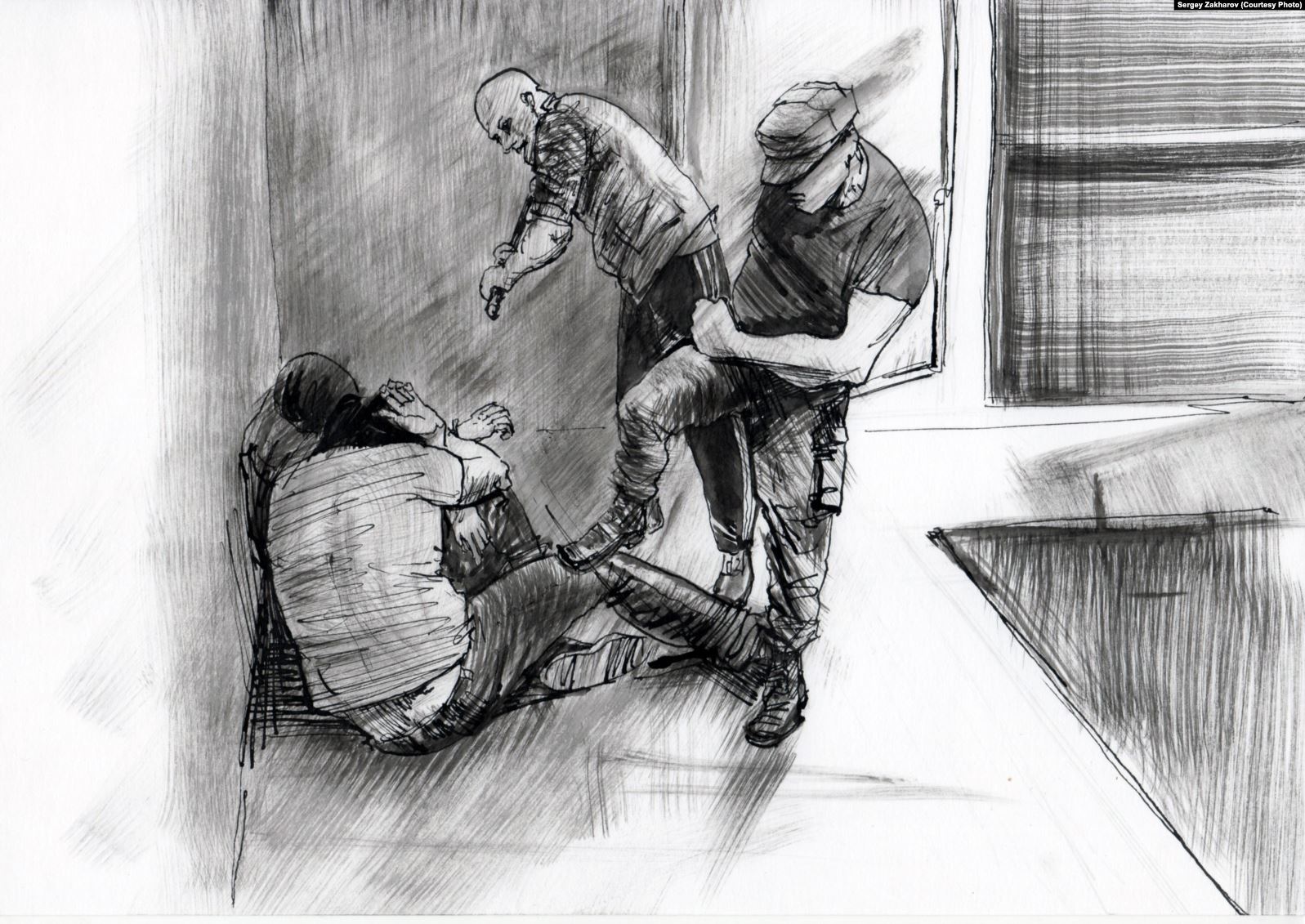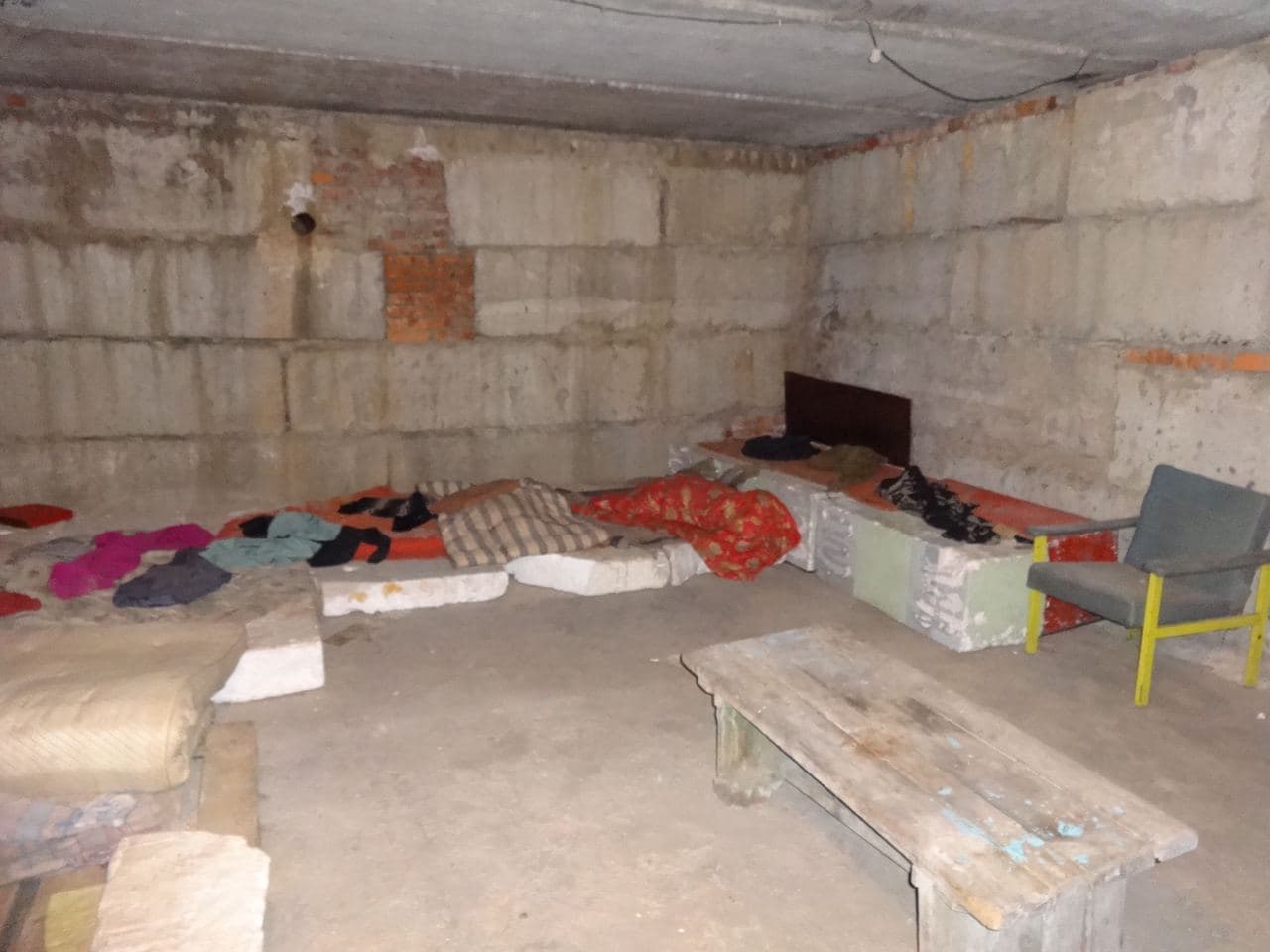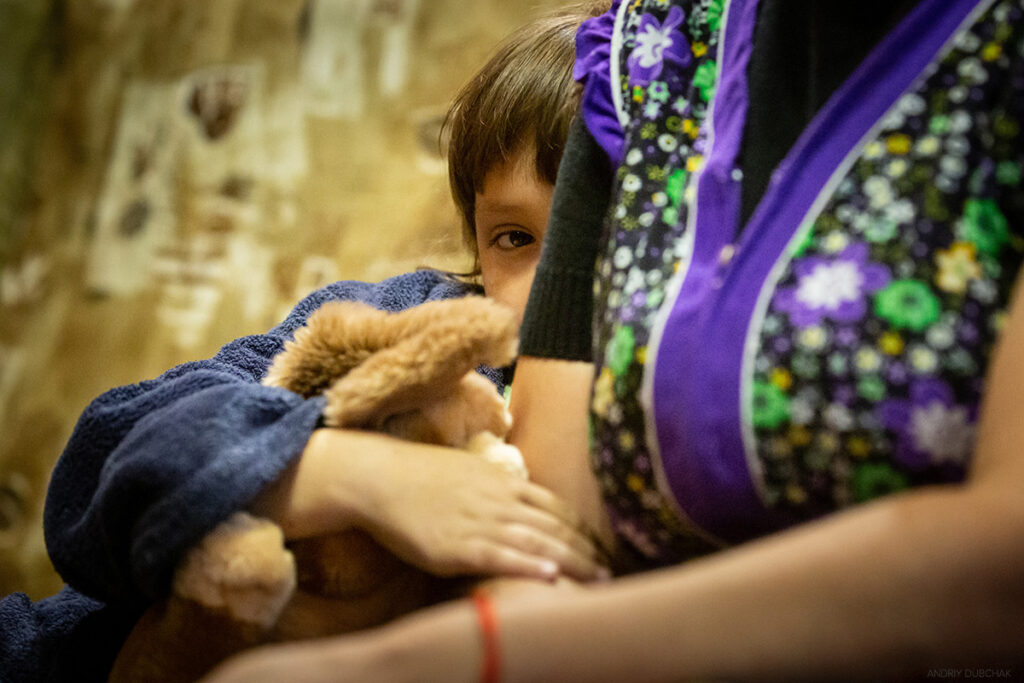It was the morning of 9 November 2017 when Maryna Yurchak, a chemical technologist from Donetsk, was detained by Russia-controlled militants on her way to work.
When Yurchak’s parents had not heard from her for the entire day, they realized something bad had happened. In fact, militants had taken Yurchak to Izoliatsia – a secret, de-facto concentration camp in the middle of occupied Donetsk – charging her for alleged espionage for Ukraine’s Security Service (SBU). In reality, the detainment was entirely because of her open pro-Ukrainian views.
“I want to be here when Donetsk becomes Ukrainian again,” she would say.
In resistance to the Russian occupation of Donbas, which began in the winter of 2014, Yurchak reported on Twitter about the locations of Russian hybrid forces, their munitions, and the locations of shelling.
Like other hostages, Yurchak was interrogated in the unsanctioned Ministry of State for Donetsk.
“They coerced her to confess who she worked for and who her curator at the Security Service of Ukraine was. Every time they would bring her back to our cell, she was badly beaten. Once she could barely walk – her legs were black and blue from the beating,” recalls Olena Lazareva, a Ukrainian hostage who was later released in a hostage exchange on 29 December 2019.
On 26 March 2020, an illegal court of the DNR sentenced Yurchak to 15 years imprisonment. Today, she remains in the Russia-controlled Snizhne penal colony №127, where she is forced to work as a seamstress for 10-12 hours per day.
The difference in data is due to SBU’s access to official files – they can better ascertain actual numbers. But in the end, the numbers are not at issue. The tortuous treatment of detainees is.
Anyone can become a hostage in occupied Donbas, and you too
On 14 October 2016, Halyna Haiova, a 62-year-old Ukrainian senior nurse, was at her hospital workplace. She answered a phone call only to hear a strange voice telling her to see the head doctor asap. As she left her office, she spotted two familiar-looking men standing with the doctor. She recognized them as having followed her on previous occasions. They were two Donetsk militants and immediately accosted and detained her.
Haiova spent more than 14 months in illegal prisons of the DNR. She worked in the maternity section of a hospital in the Russia-controlled city of Dokuchaievsk, just 40 km north of Donetsk. According to Haiova, wounded soldiers of Russia’s military received medical aid at the hospital. She would record their names and pass them on to the SBU. For that, she was tortured with electrocution and severely beaten.
In prison, she witnessed several instances of extreme torture which were tantamount to executions. Haiova was kept incommunicado in a tiny cell measuring 1 x 1 meter. Guards forced her and other prisoners to work without rest or food throughout the night. She was finally freed in a prisoner exchange in 2017.

It is no coincidence that Donbas militants arrested Haiova, a medical nurse.
The second group at high risk are people who have to cross the border with occupied Donbas for civic engagement or personal reasons. Most of them are held by authorities for lengthy document examination at checkpoints along the way.
Maryna Chuikova, a 50-year-old Ukrainian nurse, was detained at the Maiorsk checkpoint on 19 March 2018 when crossing the occupation zone back to Ukraine-controlled territory. She had planned to visit her two sons and 80-year-old mother.
For this harmless purpose, she ended up spending over a year in another illegal prison in the DNR. Finally, after a bogus 20-minute trial for false accusations, she was sentenced to 11 years of imprisonment. During her captivity, she was tortured until she succumbed to self-incrimination. She was kept in a stench-filled tiny cell with no water, no toilet, and no contact with the outer world. She was threatened to be shot on many occasions, until finally released in 2019.
Tetiana Horbulich, a former detainee of Donbas militants, spoke of a woman hostage who was arrested because she ran a tourist service for a company named Azov. Before the onset of war, she had regularly taken tourists to the sea for sightseeing. But with the siege of the Luhansk region, she was forced to stop the popular service and instead take tourists to other cities which were not yet occupied. The militants’ excuse for detaining her was that they had confused her modest business for a regiment of the National Guard of Ukraine, also referred to as Azov. Because of their sheer ignorance, they arrested yet another innocent woman.
For example, Olena Zavalna, a 58-year-old cashier, was not aware of Russia-sympathetic administrators in her city and regularly reported about occupation on her Twitter account under the pseudonym “Yuliia Ivanova.” Apparently under surveillance for some time, she was unceremoniously arrested and her unknown enforcer taunted her by saying, “Ready to face the music, Yuliia Ivanova?”
Anastasiia Mukhina, a 73-year-old pensioner from Luhansk and former Donbas hostage, was seen hanging flyers displaying the Ukrainian flag and the statement “Luhansk is Ukraine.” Within moments, she was accosted and arrested. She was imprisoned, and lived almost two years in horrific conditions for allegedly “inciting hatred between nations, the overthrow of the government, and change of borders.”

Violent interrogations of Ukrainian hostages
Charges brought against hostages are for the most part “political” – that is, reflecting their “dissident” views. These bogus charges include espionage, state treason, sabotage, and terrorism. Espionage and state treason are the most common accusations in Russia-controlled DNR and LNR.
The de facto Russian administrators in these regions are well-aware that ordinary citizens are not likely to be involved with Ukrainian defenders that the occupiers label as terrorists. They are also aware that civilians are prone to steer clear of any pro-Ukrainian activism in occupied Donbas, out of sheer fear.
Often, these churned-out confessions are literally beaten out of hostages. Since charges are trumped-up, the only proof of crime Donbas militants can possibly obtain is through forced confessions. And this is not achieved without threats and the savage use of force.
Viacheslav Shabolda, a resident of Donetsk, was detained by militants at his hotel workplace on 24 June 2019. Militants forced a plastic bag over his head and took him to the DNR’s “Ministry of State Security” for interrogation. Then, he was transferred to Izoliatsia, where prison guards tortured him. They pulled out his teeth, electrocuted him, and threatened to kill his children if he did not sign a confession.

Maryna Chuikova, arrested on the same charges, recalls that during interrogation she was denigrated, abused, and forced to sign documents that had been prepared in advance. When she refused to speak, let alone sign the documents, a female guard took her to see a fellow inmate who had been beaten to a pulp on her watch. She said they would do the same to Chuikova if she did not cooperate.
Anastasiia Mukhina, is another prisoner who had to undergo forced interrogation. Pro-Russian officers hung her on a door, kept her without food and water for days, and threatened to kill her family members.
Chuikova recalls what she witnessed in prison:
“All women that arrived in a detention center from Izolyatsia had signs of extreme physical abuse. Once, they threw a young woman into our cell … She had shattered teeth, swollen legs, bruises, a broken nose, concussion and [as we later learned] kidney failure. It is frightening even to imagine what torment she had to go through.”
Failure to provide medical aid to hostages may be regarded as torture, too. Maksym Tymofieiev, a 33-year-old Ukrainian hostage, was arrested on 11 October 2017 and is currently being held in the Makiivka penal colony № 32. His extreme torture has resulted in major disabilities – atrophy of the thyroid gland, cerebrospinal fluid-vascular dystonia, and damaged brain tissue. No medical attention or medication is provided to Tymofieiev – the little pain relief he receives is smuggled in by his elderly mother.
Detention conditions of the Kremlin's Ukrainian hostages
“After an exhausting interrogation and several sleepless nights, I would fall asleep without noticing the cockroaches – they bit me badly and the wound rotted for more than a month,” recalls Olha Politova, a former woman hostage who spent two years in the Makiivka prison colony.

The former Ukrainian hostage describes sleeping on a bed of metal springs and a thin tattered mattress. Menstruating women were not provided with any items, such as sanitary pads or tampons. They had to use strips from their mattresses and then slept on bare metal plates.
Poor sanitary conditions, together with debasing treatment, and physical and mental abuse is tantamount to inhumane treatment and torture. Such circumstances are created deliberately to torment prisoners into signing self-incriminating testimonies.
Chuikova spent 30 days in a basement of Russia’s Ministry of State Security in occupied Donbas.
“The room was tiny, 2.5 meters, dirty and freezing. There was nowhere to take drinking water. There was no toilet … Bottles with urine and blood left from the former detainee stood next to me. An awful stench! … The walls stank, too. Soon I realized it was the smell of terror and adrenalin,” the Ukrainian hostage recounts.
In fact, the total number of Ukrainian hostages in occupied Donetsk and Luhansk regions may be several times higher, because hostages have been released without Ukraine’s intervention. Some due to a lack of evidence, and some after a hefty ransom payment by relatives.
These hundreds of hostages of Donbas are awaiting their release which can only be possible through a Russia-Ukraine prisoner exchange. The last exchanges took place on 16 April 2020 and 29 December 2019. The possibility of a new Russian invasion in early 2022 makes that likelihood very slim.
Russia pretends it is willing to resolve the conflict by joining the Normandy Format, engaging in talks about the importance of the Minsk Agreements, or claiming the need to “protect” the Russian-speaking population in Donbas. However, it has shown its real face when blocking any hostage exchanges previously agreed to in the Minsk peace deal.
Related:
- Pregnant, tortured, seriously ill: the women devoured by concentration camp of Russian-occupied Donbas
- “F*cking execute her!” Torture, forced labor, one bottle of water a day: how a Ukrainian woman hostage survived the prisons of Russia-occupied Donbas
- First public photos of Russian-run Donetsk concentration camp leaked online
- Luhansk militants tortured disabled Ukrainian woman to make her “confess” she is a spy
- Hundreds of victims of war criminals in Russian-occupied Donbas await justice. Here is what can help them
- I survived the basement prisons of the “Luhansk People’s Republic.” Here is what I saw. Part 1
- I narrowly escaped death in dungeons of the “Luhansk People’s Republic.” This is what saved me. Part 2
- Surviving the “DNR/LNR”. Photo project reveals the horror of captivity
- These four stories show anybody can be jailed in occupied Donbas (and you, too)
- A businessman, nurse & food technologist: stories of three civilian hostages in occupied Donbas
- War crimes in occupied Donbas: every second prisoner tortured, 16% witnessed executions
- A month of freedom: released hostages tell about captivity and torture in occupied Donbas
- “Russians taught how to torture.” Ex-captives of Donbas “republics” share horrors of basement prisons
- “Our men are rotting alive!”- say wives of Ukrainian POWs held in “DNR/LNR”

